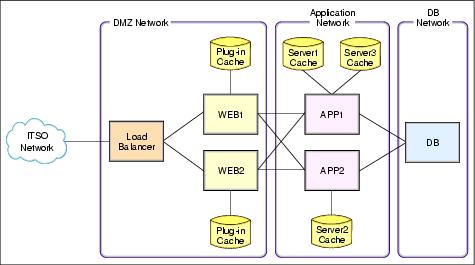External caching by Web server plug-in
WAS leverages the Edge Side Includes (ESI) specification to enable caching and assembly of distributed fragments.
Edge Side Includes is a simple mark-up language used to define Web page fragments for dynamic assembly of a Web page at the edge of network. ESI is an open standard specification supported by Akamai and leaders in the Application Server, Content Management Systems, and Content Delivery Networks markets.
With the Distributed Fragment Caching and Assembly Support, WAS customers can defer page assembly to any ESI compliant surrogate server, such as Akamai EdgeSuite service. This may result in a significant performance advantage if fragments can be cached and reused at the surrogate.
WAS provides distributed fragment caching and assembly support through the Web server plug-in. WAS uses the Web server plug-in to communicate with the HTTP Server. This plug-in has the ability to cache whole pages or fragments. Additionally, it can dynamically assemble Web pages containing ESI <esi:include> tags. Any server with WebSphere HTTP plug-in support can gain the benefits provided by the WAS dynamic cache service. Figure 14-31 show the infrastructure topology we used for this scenario. As you can see here, the edge cache resides on the Web server machines:

Figure 14-31 ITSO Web server plug-in infrastructure
With dynamic cache service's external cache control, distributed fragment caching and assembly support, dynamic content can be exported, cached, and assembled at the most optimal location, closer to the end user. More important, WAS can maintain control of the external cache through its Invalidation Support to ensure the freshness of cached content. As a result, WAS customers are equipped to create and serve highly dynamic Web pages without jeopardizing page performance and user experiences.
In Edge Side Includes we provide some existing ESI benchmarks for the Trade3 sample application.
WebSphere is a trademark of the IBM Corporation in the United States, other countries, or both.
IBM is a trademark of the IBM Corporation in the United States, other countries, or both.